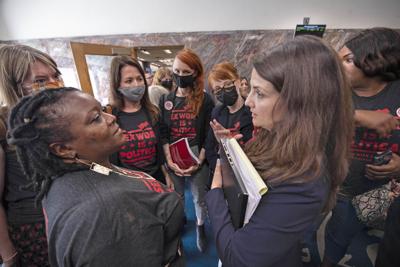A legislative proposal to decriminalize prostitution in Louisiana was shelved Tuesday after hours of public testimony from sex workers and amid concerns the measure could exacerbate human trafficking.
House Bill 67 from New Orleans Democratic Rep. Mandie Landry would have lifted criminal penalties for a dozen prostitution-related offenses, including the purchasing or selling of sex between consensual adults; recruiting or procuring sex workers; and operating brothel-like institutions.
Supporters of the measure argue that sex work is a valid form of labor when it's consensual, and that criminal penalties only make the trade more dangerous by discouraging victims from coming forward after experiencing abuse or assault.
“The problem with criminalizing consensual sexual behavior is the people involved in it can't go to law enforcement themselves when they're a victim of a crime or witness a crime,” Landry said.
The measure faced a wave of opposition from a slew of anti-trafficking organizations who said it would cause demand for prostitution to skyrocket and fuel the underground trade in sex slaves. They bristled at the idea of lifting penalties on brothel-owners, pimps and those purchasing sex.
"We do strongly agree that people engaging in prostitution should not be criminalized," said Sheri Lockridge, who works with human trafficking victims at the Covenant House in New Orleans. "However, repealing the law against purchasing sex would significantly increase demand, driving traffickers to get more supply and placing more vulnerable people at risk."
Gloria Blankenship, who works with sex workers in Shreveport through the organization "Purchased: Not for Sale," said full decriminalization will lead to a surge in sex trafficking and that the bill is a "simple solution to what is a really, really complex problem."
"With all due respect, can any of you tell the difference between sex work and sex trafficking?" added Natasha Guynes, a former sex worker and founder of the Washington-based nonprofit HER Resiliency Center.
Landry repeatedly pointed out that the proposal wouldn't do away with Louisiana's existing human trafficking statutes, which make it a crime to force another person into labor through violence or fraud. Others said that decriminalizing prostitution could free up time for law enforcement to focus on investigating and prosecuting human trafficking.
Andrew Lewis, who helped launch the Greater New Orleans Human Trafficking Task Force in 2015, said he sat in on a sting operation in which law enforcement officials lured prostitutes to hotel rooms on false pretenses then promptly arrested them, even if they claimed to be victims of trafficking.
“The same agent that handcuffed them asked if they were trafficked and no matter their response, they were arrested and booked,” Lewis said. "We need to create a community where sex workers feel safe enough to report actual sex trafficking."
Amira Barakat Al-Baladi testified that after working a shift as a stripper, she agreed to have sex with a patron for compensation. The encounter turned to rape once he removed the condom against her will, but she opted against reporting the assault out of fear of being prosecuted for prostitution.
“He raped me because he knew he could get way with it,” Al-Baladi said. “If I went to a hospital or police station for help, I would be criminalized or possibly arrested.”
A first-time conviction for purchasing or selling sex can carry a prison sentence of up to six months. A third violation carries a maximum punishment of up to four years in prison and $4,000 in fines. A'Niya Robinson, with the ACLU of Louisiana, said those punishments can cause a ripple effect, impacting a person's housing or employment for years to come.
“We believe a government should not be telling consenting adults who they should be having sex with and on what conditions,” Robinson said.
Melissa Flournoy, a former state legislator who now chairs the board of Louisiana Progress Action, said the debate is laced with hypocrisy and that sex workers – not the patrons who pay for the sex – often bear the brunt of criminalization.
She noted that those patrons frequently include the state's political power brokers – name-dropping former U.S. Sen. David Vitter, whose phone number infamously appeared in the client list of a Washington high-end escort service.
“If we don’t prosecute the men who are the driving force for sex work, then we shouldn’t be prosecuting the women either,” Flournoy said.
Landry voluntary deferred the proposal at the end of the three-hour hearing.

